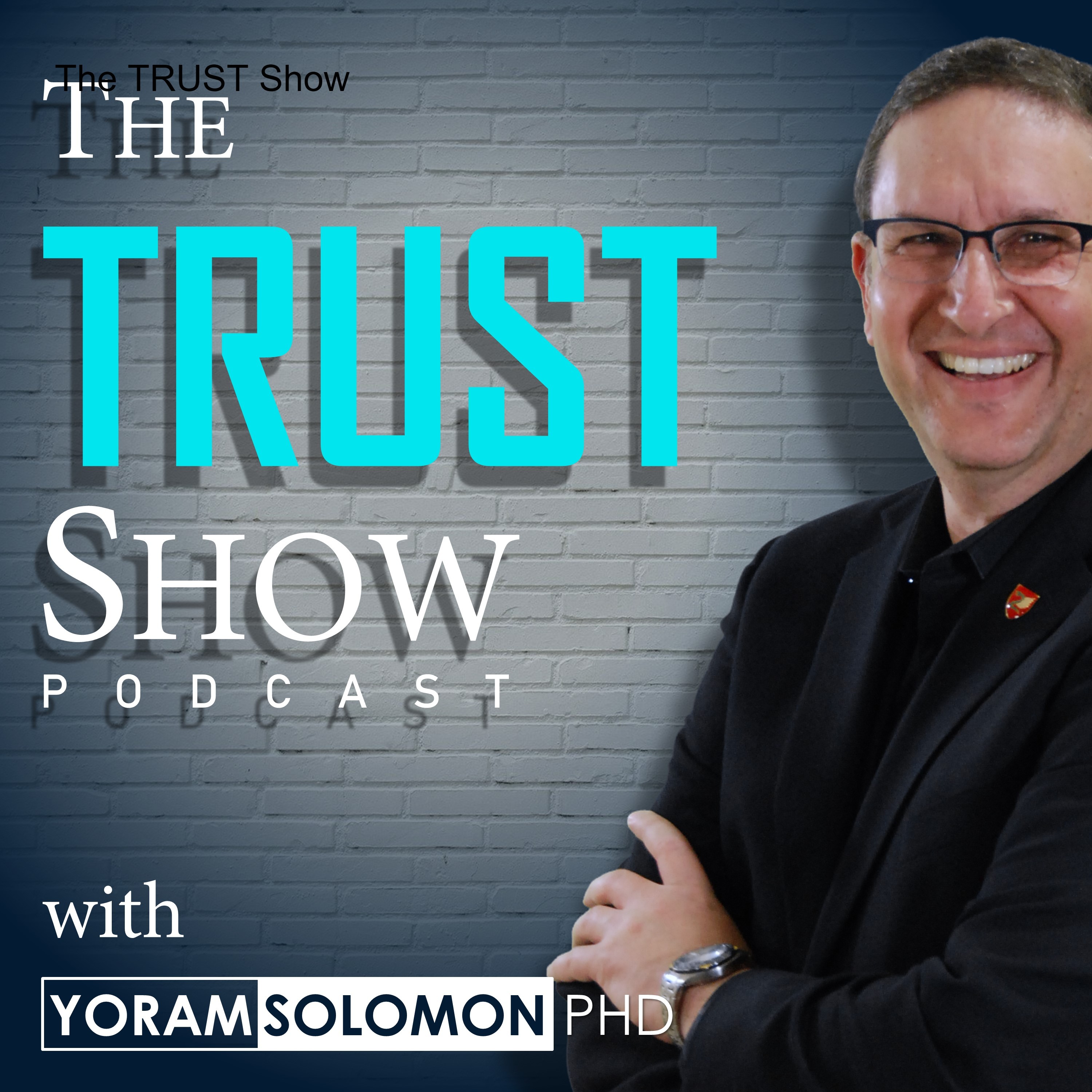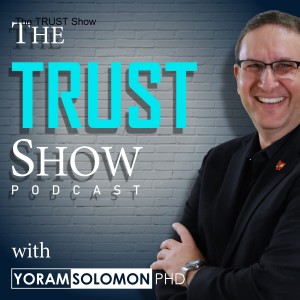
17.4K
Downloads
195
Episodes
Trust is not what you think it is. It is not absolute or universal. Trust is relative. The same behavior that would cause one person to trust you could cause another person to distrust you. The level of trust someone has in you is the product of their trustfulness (their willingness to trust other people) and your trustworthiness. There is almost (I said ALMOST) nothing you can do about the former, and everything you can do about the latter. Because of that, you must evaluate your own trustworthiness one relationship at a time, separately. Odds are, though, that the same behaviors that are holding you back from being more trusted in one relationship are holding you back from being more trusted in other relationships. Welcome to The Trust Show. I’m your host, Yoram Solomon, a top 10 trust expert and researcher, the author of the book of trust, and the creator of the Trust Habits® workshop that helps people and organizations form new habits that change old behaviors, build trust, and transform organizations. In this educational podcast, I will challenge you to think differently about trust, through the 8 laws of trust and the 6 components of trustworthiness. I will share my own stories, experiences of others, trust research, and sometimes, reflect on a news item. And through those, I will show you how to build trust, be trusted, and know who to trust. Because the answer to this question will have the biggest impact on your personal and professional, success or failure: can you be trusted?
Trust is not what you think it is. It is not absolute or universal. Trust is relative. The same behavior that would cause one person to trust you could cause another person to distrust you. The level of trust someone has in you is the product of their trustfulness (their willingness to trust other people) and your trustworthiness. There is almost (I said ALMOST) nothing you can do about the former, and everything you can do about the latter. Because of that, you must evaluate your own trustworthiness one relationship at a time, separately. Odds are, though, that the same behaviors that are holding you back from being more trusted in one relationship are holding you back from being more trusted in other relationships. Welcome to The Trust Show. I’m your host, Yoram Solomon, a top 10 trust expert and researcher, the author of the book of trust, and the creator of the Trust Habits® workshop that helps people and organizations form new habits that change old behaviors, build trust, and transform organizations. In this educational podcast, I will challenge you to think differently about trust, through the 8 laws of trust and the 6 components of trustworthiness. I will share my own stories, experiences of others, trust research, and sometimes, reflect on a news item. And through those, I will show you how to build trust, be trusted, and know who to trust. Because the answer to this question will have the biggest impact on your personal and professional, success or failure: can you be trusted?
Episodes

Tuesday Jul 16, 2024
S14E3: Finding and Maximizing Your Trust Premium: The Process
Tuesday Jul 16, 2024
Tuesday Jul 16, 2024
In this episode, we move from theory to practice. Learn how to identify the highest trust premium in your industry and discover the behaviors you need to change to attract high-trust customers. We'll also explore strategies to retain existing customers, even against competitors offering discounts. Using W. Edward Deming's wisdom, "If you can't describe what you are doing as a process, you don't know what you're doing," we'll outline a step-by-step process and introduce the Trust Habits method to build trustworthiness and maximize your trust premium. Tune in for practical steps to elevate your business's trust level and increase your Trust Premium.

Tuesday Jul 09, 2024
S14E2: The Importance of Post-Purchase TRUST
Tuesday Jul 09, 2024
Tuesday Jul 09, 2024
The Trust Premium framework focuses on the value customers see in trusting the salesperson or professional, making them even willing to pay a higher price or fee. So, being trusted by the customer before purchasing is essential. Not only do customers buy from people they trust, but they are willing to pay that premium. But what happens after the purchase is done? It is imperative to maintain and grow trust after the purchase, whether you want them to make repeat purchases, even if this is a single purchase. In this episode, you will learn why.

Tuesday Jul 02, 2024
S14E1: Make vs. Buy: Should you do things yourself or hire someone to do them?
Tuesday Jul 02, 2024
Tuesday Jul 02, 2024
Often, when you run your own business, you face the decision of doing something yourself or hiring someone to do it. It is not an easy decision. As a professional speaker, I face that decision on a weekly basis in different functions of my business. Over the years, I developed a three-step process to make those decisions: separate different functions, identify the alternatives for each one, and use criteria to make the decisions. In this episode, I will show you how.

Tuesday Jun 18, 2024
S13E12: "Trust but Verify?" Try "Trust but Specify!"
Tuesday Jun 18, 2024
Tuesday Jun 18, 2024
Is it good to “Trust but verify?” When you verify, aren’t you showing that you don’t trust? In this episode, I will analyze this management approach. Does it really work? I found a 2004 research article that claimed that the more you verify, even in a high-trust self-managed team, the better the performance is. But I will also discuss what’s missing from that study, and will finally suggest that instead of “Trust but verify,” you should practice “Trust but specify.”

Tuesday Jun 11, 2024
S13E11: The 3 Principles of Trustworthiness: Relativity, NoBS, and Empathy
Tuesday Jun 11, 2024
Tuesday Jun 11, 2024
There are many benefits to being trusted. One condition to be trusted is to be trustworthy. It’s still not a guarantee that you will be trusted, but it’s a prerequisite. So, what makes you trustworthy? Over the years, I observed 8 laws of trust, and developed my 6-component relative trust model. Instead of talking about those, today, in this episode, I will talk about the 3 principles of trustworthiness, that are the basis for the relative trust model.

Tuesday Jun 04, 2024
S13E10: Do you TRUST God? With Guest Reverend Mike Bronsky
Tuesday Jun 04, 2024
Tuesday Jun 04, 2024
Who do you trust? In The Book of TRUST, I claimed that there are three entities you trust. You trust yourself, you trust God, and you trust other people. Trusting yourself is the one thing that determines your risk-tolerance level without having to trust anyone else. Trusting other people is what most of my work focuses on. But how about trusting God? Do we all trust God? Do we trust God to the same extent? To answer this question, I brought a guest to this episode. Mike Bronsky is a reverend. You will hear only a fraction of what I know about his life, and what made him a man of God. Mike is one of the only people in the world I know who has completely pure intentions. There are no games with him. He means what he says, and he says what he means. He takes a lot to heart. He helps other people as much as he can. He believes in God and helps others believe in God. So, I decided to ask him this question: do you trust God?

Tuesday May 28, 2024
S13E9: What is TRUST? Why do we Need it?
Tuesday May 28, 2024
Tuesday May 28, 2024
This episode will give answers to both questions. It starts with describing the connection between reward, risk, fear, and trust, explaining why we even need trust and how it plays a role in our willingness to take risks to get rewards. Later in the episode, I will provide my own definition of trust, breaking it down into its components. This episode incorporates findings from my recent study of our attitudes toward trust and risk-taking and identifies gender and age differences in those attitudes.

Tuesday May 21, 2024
S13E8: You Get what you Paid for…
Tuesday May 21, 2024
Tuesday May 21, 2024
The foundation for the Trust Premium™ concept is that we pay first and get value later, and we must trust the salesperson or professional that they will provide value. The value is no less important than the price because of a few deeply ingrained beliefs such as "You get what you paid for," "There is no such thing as a free lunch," and "If something is too good to be true, it probably is," as they influence consumer behavior. I took those beliefs to the test through a study I conducted, and in this episode, I will provide the findings from that study and gender and age differences in these beliefs. Learn about the foundation and implications of the trust premium in today's market.

Tuesday May 14, 2024
S13E7: TRUST without Respect? Respect without Trust?
Tuesday May 14, 2024
Tuesday May 14, 2024
In this thought-provoking episode, we dive deep into the nuanced relationship between trust and respect. Exploring real-life scenarios and expert insights, we challenge conventional wisdom to uncover the intricate dynamics that govern our personal and professional relationships. Discover how trust and respect interact in complex ways, shaping how we connect with others, and reconsider the foundations of interpersonal relationships. This engaging discussion provides a fresh perspective on the critical elements that influence our interactions. Find out the answers to the questions: can you trust someone without respecting them, and can you respect someone and yet not trust them?

Tuesday May 07, 2024
S13E6: 3 Ways to Think Differently About TRUST
Tuesday May 07, 2024
Tuesday May 07, 2024
I am often asked, “What is unique and different about your approach to trust?” In this episode, I cover that unique approach to understanding trust, emphasizing its relative, reciprocal, and two-sided nature. I challenge the traditional view of trust as a universal and static attribute, illustrating instead how trust is a dynamic interplay that depends not only on the trustee's actions but also on the trustor's willingness to trust. This discussion sheds light on how personal experiences, cultural backgrounds, and individual perceptions influence establishing and maintaining trust across various relationships and situations.
